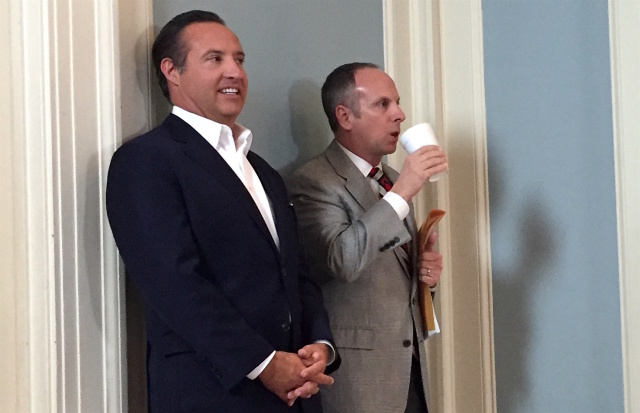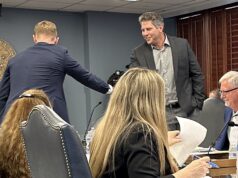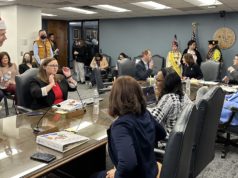
Preston Doerflinger proudly calls himself a blunt talker. The Oklahoma secretary of finance does not like to mince words.
“I speak very directly in an environment where that doesn’t frequently happen,” Doerflinger said last week in an extensive interview. “I don’t whitewash things, and I don’t try to use political speak, and I think that people deserve to know exactly where someone stands, and that’s going to cause me from time to time to be placed in positions where someone is going to call for my head on a platter.”
Doerflinger’s words turned prophetic Monday when Rep. Mike Brown (D-Tahlequah) filed House Resolution 1064, a verbose call for Gov. Mary Fallin to suspend Doerflinger without pay or benefits.
In an interview Tuesday, Brown noted a controversial radio appearance where Doerflinger criticized Republican legislators and Oklahoma Superintendent of Public Instruction Joy Hofmeister about a stalled school vouchers bill.
“I just don’t think we’re together on a lot of things, and I’d like to see some change,” Brown said. “I don’t think it’ll happen, but at least I’m pointing it out that we need to make some change up here because I’m tired of being on the train that’s run off the track every year. And next year’s going to be worse.”
Ironically, Doerflinger’s comments and concerns about state financing are relatively in line with those of the Democrat criticizing him.
“I think it’s important that we have serious discussions and deliberation about recurring revenues in this state,” Doerflinger said before noting he actually was speaking delicately for a change. “I remain optimistic that that’s going to continue through the course of the session.”
While background conversations with state officials, budget experts, lobbyists and legislators embody something far from “optimism” ricocheting around Capitol hallways, Doerflinger said his efforts in pushing for an effective budget agreement with the Legislature require time.
RELATED
Oklahoma revenue failure: ‘There you have it, folks’ by William W. Savage III
In some ways, he’s been arguing for tax reform, tax credit reform, new revenues and off-the-top allotment reform for years.
“Sometimes I get impatient and want things to move more quickly,” he said. “I want people to be more decisive. There’s one word that my team members hear more than any other, and that’s ‘Go.’ We move here and move quickly, and that’s probably why I’m not an elected member of the Legislature.”
But when Brown was asked multiple times what blame legislative leaders should face regarding the state’s financial problems, he pivoted back to Doerflinger, criticizing the former City of Tulsa auditor for the state’s low gross-production tax rates on oil and gas drilling.
“He is the budget manager, and he is the one who creates the budget for the governor,” Brown said.
What Doerflinger can’t do, however, is force the Legislature to pass the governor’s budget and her proposed changes to the state’s sales tax system that would bring in more revenue.
“For one thing, they obviously have their own ideas, and they’ve been exploring those. But I’ve not been disheartened,” Doerflinger said. “They are still being discussed, and they are part of the overall puzzle that we’ll put together to make this budget work.”
Asked for an update Tuesday for how the Senate’s own ideas are shaping up, Aaron Cooper, the communications director for President Pro Tempore Brian Bingman (R-Sapulpa), said the chamber is “looking at all options” for addressing the $1.3 billion shortfall.
“As Pro Tem Bingman has said, it’s time for legislators to get real about the budget crisis and enact serious reforms,” said Cooper. “Senators have offered up a variety of solutions ranging from tax credit and incentive reforms, consolidations, and reforms to apportionments and ‘off-the-top’ revenues. It’s still relatively early in the legislative session, and budget negotiations are ongoing. It’s a tough budget year and the situation isn’t likely to get better soon.”
Gross production mischaracterization
Brown believes the situation is likely to get worse.
“I got kids and grandkids who are going to inherit this mess,” he said, pointing to what he called an income tax cut that primarily helps the wealthy and corporate giveaways in the form of tax breaks.
But in regard to the state’s low gross production tax rate, Brown’s portrayal of Doerflinger’s position contradicts public accounts on the topic.
‘Chicken crap’
Rep. Mike Brown (D-Tahlequah) offered the following extended analogy to critique Oklahoma’s tax-credit system for businesses and industries:
“Now, if I was to sell you tomato seeds, and sell whoever you got right next door to you the same tomato seeds, and I come back and I said, ‘Hey, I tell you what, I got $1 million worth of Miracle-Gro here that, if you don’t put it on your tomatoes they won’t grow.’ But your neighbor puts his in the same dirt you put yours in and they receive the same rain, and I guarantee you, you can put $1 million worth of Miracle-Gro on yours, and his is going to grow just as good with chicken crap on it.
“Now, you’ve bought $1 million worth of Miracle-Gro, and you’ve got tomatoes, but I guarantee you I could grow the same tomatoes with chicken crap. Now, I’m going to play the devil’s due here and say that a lot of these companies play state against state and say, ‘We’re not coming to your state unless you give us a (tax) credit.’ They play that. Well, don’t show your ace in the hole on everything, but we’ve got a lot to offer in the state of Oklahoma, whether it’s in aerospace, whether it be in whatever.
“By Aubrey McClendon’s own words, they didn’t buy the Seattle Sonics to leave them up there. They didn’t buy the Thunder to leave them up there. So they were coming here anyway. Why are we paying an incentive and putting them on the Quality Jobs Act … why are we doing that when they’re going to move here anyway? So that’s like, why are we pouring $1 million of Miracle-Gro on these tomatoes when they’re going to grow anyway?”
— 3/22/16
In 2013, Doerflinger called for legislative leaders and the state’s energy industry to re-examine the horizontal drilling tax incentives that had been passed in 2010, the year before he was appointed by Gov. Fallin.
“The boom in the energy industry is improving Oklahoma’s economy in so many ways, but the general revenue fund isn’t seeing the benefits it would have before 2010,” Doerflinger said in a release at the time. “The 2010 law has led to some real revenue loss. In our estimation, policymakers should consider revisiting this law in consultation with the energy industry to determine whether it is fair and equitable to the industry, the state and all its taxpayers.
“Any fiscally responsible policymaker needs to seriously consider at what level government should (we) incentivize something that is now standard practice. It’s not responsible for government to give money away as an incentive if no incentive is needed.”
Those blunt comments sparked criticism and pushback from some industry leaders who opposed raising the tax rate.
Years later, after a legislative agreement that raised the rate slightly while preserving major credits for the energy sector, Doerflinger is still seeking a broadening of the state revenue base.
“It’s not about me and some personal views,” he told NonDoc. “It’s that we’re trying to put the state on better fiscal footing moving forward, and (recurring revenues are) how you do it.
“There are proposals and ideas that we’ve brought up year in and year out that, frankly, would begin to set us on a different course, and it is frustrating and rewarding at the same time. I can say something one year, and maybe it’s a new idea to someone else two years later. I do believe it really doesn’t matter who gets the credit.”
But for speaking bluntly, calling out lawmakers of both parties and even engaging strangers in political argument on Facebook, Doerflinger has drawn more criticism than credit of late.
“He should say, ‘Either bring it on, or I’m gone,’ and if he’d do that, I’d be behind him,” Brown said of Doerflinger.
In reality, Doerflinger has made such a statement.
“I have said that we cannot rely more on one-time funds in this budget than recurring revenues,” Doerflinger noted last week. “And I did go so far as saying if we did that — or if we balance this budget on the back of pension systems — that I would quit, and my position hasn’t changed on that. We have to get away from using the one-time funds (to fill the whole budget gap.)”
On that, Brown agrees.
“It adds up, and this camel can’t carry anymore,” he said. “You’ve kind of broken their back.”






















